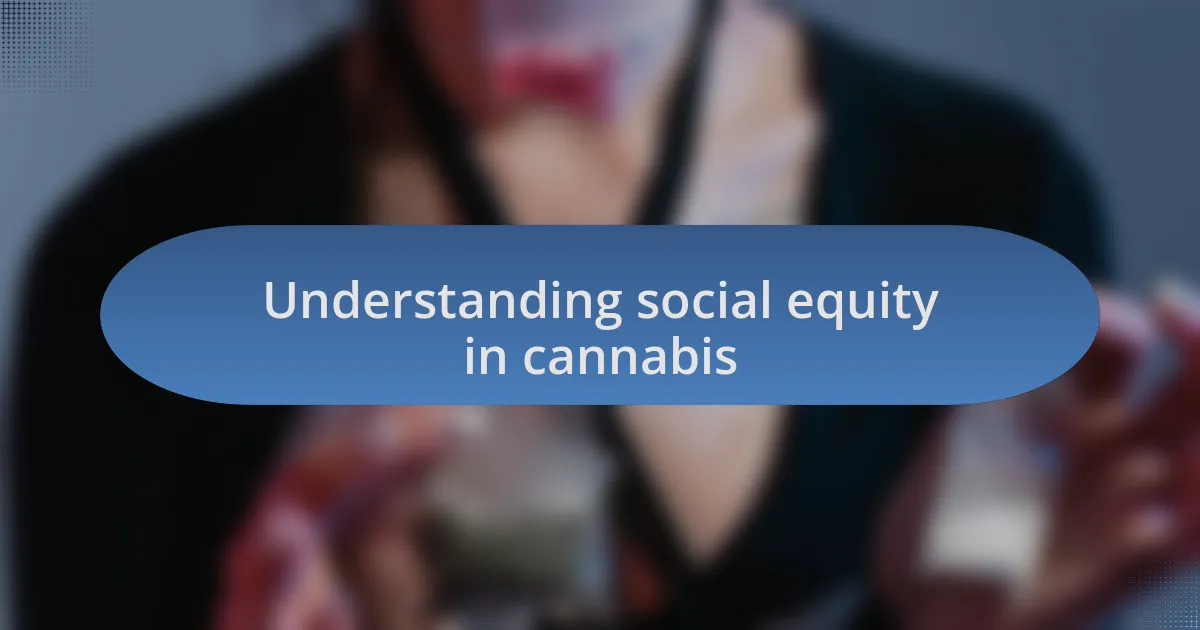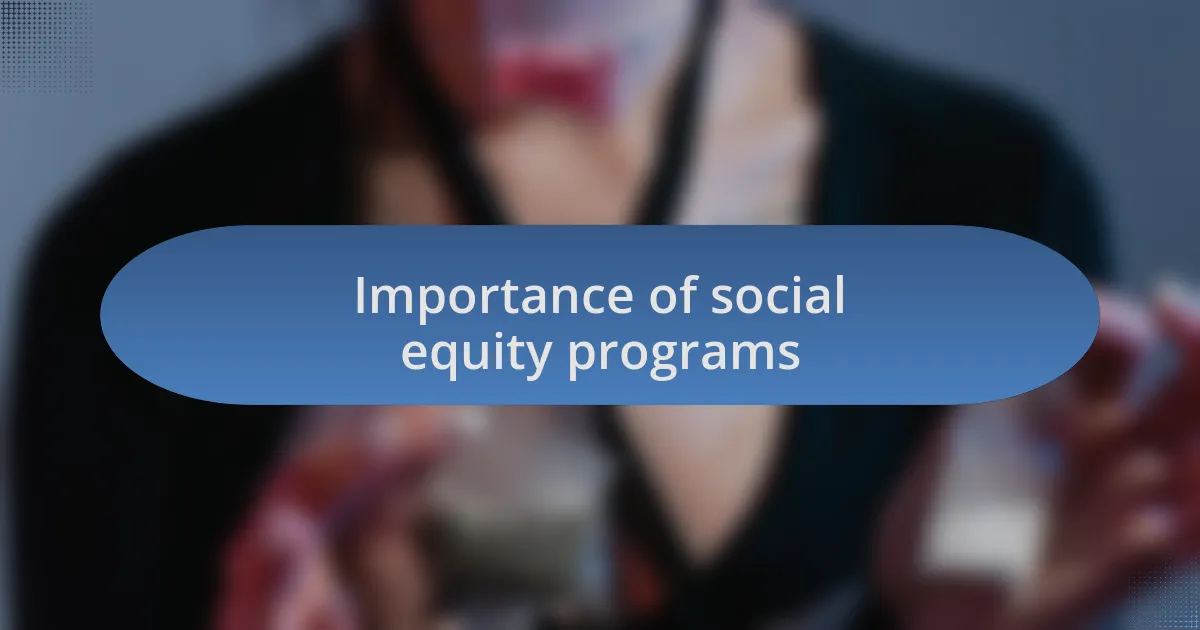Key takeaways:
- Social equity in cannabis aims to support communities impacted by prohibition, addressing systemic barriers to participation in the legal market.
- Social equity programs are essential for restoring dignity and opportunity, creating economic benefits, and fostering community resilience.
- Cannabis expos serve as platforms for education, networking, and promoting inclusivity, emphasizing the importance of diverse voices in policy-making.
- These events facilitate connections and provide resources for marginalized entrepreneurs, highlighting the role of education and collaboration in promoting equity.

Understanding social equity in cannabis
Social equity in cannabis means ensuring that communities disproportionately affected by prohibition and criminalization gain access to the burgeoning legal cannabis market. I remember attending a local forum where advocates shared stories of individuals who’ve spent years incarcerated for actions now considered legal. It struck me deeply—how can we move forward without addressing the harms faced by these communities?
Navigating the complexities of social equity can be perplexing. For instance, I often found myself wondering: How do we truly level the playing field? It’s not just about creating licenses; it’s about dismantling systemic barriers that have long held back those eager to participate. I can recall speaking with a young entrepreneur who, despite having the vision and drive, faced countless hurdles simply because of his past. Hearing his frustration made me realize just how crucial it is for policies to be inclusive.
Moreover, social equity programs are designed not only to provide business opportunities but also to foster community investment. I think back to a local initiative I came across that allocated a portion of cannabis tax revenue to support education and job training in underserved neighborhoods. It was a powerful reminder that, beyond economic opportunities, we must also heal and uplift these communities. How can we expect a thriving industry if we ignore the roots of its growth?

Importance of social equity programs
Social equity programs are vital for creating a more level playing field in the cannabis industry. When I first learned about these initiatives, I realized they represent a commitment to repaying the debt owed to communities impacted by the war on drugs. Can you imagine how transformative it would be for individuals who have been systematically marginalized to finally gain legitimate access to an industry that was once out of reach?
I distinctly remember speaking with a group of activists who were passionate about developing social equity frameworks in their state. Their collective determination was inspiring; they emphasized that such programs aren’t merely about financial gain but are also about restoring dignity and opportunity. This conversation made me ponder: what kind of industry do we want to build? One that thrives solely on profits or one that uplifts and empowers its contributors?
Additionally, social equity initiatives strengthen communities by producing a ripple effect of benefits. I watched as a local entrepreneur who secured funding through a social equity program opened a cannabis shop that became a hub for the community. This wasn’t just a business; it became a space for dialogue, education, and pride. What if every city had a similar story? It’s clear that the importance of these programs extends far beyond access; they foster resilience and unity within the very communities that deserve it most.

Overview of cannabis expo events
Cannabis expo events serve as a vibrant hub for industry stakeholders, where education and collaboration intersect. I remember attending my first expo and feeling overwhelmed by the sheer diversity of exhibitors and ideas. It was fascinating to witness how each booth represented different facets of the industry, from cultivation techniques to innovative product offerings. Have you ever considered how these events can shape the future of cannabis? They not only showcase products but also foster conversations around crucial topics, including social equity.
During one particular expo, I stumbled upon a panel discussing the importance of community involvement in cannabis policy-making. The speakers, each with their unique backgrounds, shared personal stories that highlighted the pressing need for inclusivity. Their passion was contagious, and I found myself reflecting on how essential it is for individuals from all walks of life to have a seat at the table. I couldn’t help but think: How can we create a more welcoming environment if we don’t actively seek out diverse voices in this space?
Moreover, these expos often host workshops and networking opportunities designed to empower attendees. I participated in a session focused on business development for aspiring cannabis entrepreneurs, and the advice shared by seasoned professionals was invaluable. It struck me that these gatherings are not merely conventions; they are catalysts for change. Are we taking full advantage of these platforms to ensure the cannabis industry reflects the values of equity and inclusion we strive for? Such events remind us that the journey to social equity in cannabis is collective, with everyone playing a crucial role.

How cannabis expos promote equity
Attending cannabis expos has truly opened my eyes to how equity is promoted in numerous practical ways. I recall a moment when I witnessed a workshop dedicated to helping marginalized communities navigate the complexities of starting a cannabis business. The workshop leaders shared heartfelt stories and actionable strategies, making it clear that these events prioritize lifting up those who have historically been left behind. Have you ever thought about the transformative power of education in creating equitable opportunities?
Another aspect that stands out is the emphasis on partnerships among diverse groups at these expos. I remember chatting with a woman who was part of a nonprofit that connects minority-owned businesses with resources in the cannabis space. Her enthusiasm was infectious, and it dawned on me how these expos facilitate connections that might not occur otherwise. Isn’t it empowering to think that these gatherings serve as a bridge for collaboration and innovation across different communities?
Additionally, many expos spotlight social equity programs, allowing attendees to learn about vital initiatives. I visited a booth dedicated to advocating for legislative reforms aimed at supporting equity within the cannabis industry. Hearing representatives passionately discuss these programs solidified my belief that cannabis expos play a crucial role in the larger conversation around justice and reform. It made me ask: How can we all contribute to this momentum and ensure these equity initiatives have lasting impact?

Insights gained from attending expos
I’ve gained a deeper understanding of the diverse representation within the cannabis industry through my experiences at expos. At one event, I met individuals from various backgrounds sharing their unique journeys in this space. Their resilience and creativity inspired me; it was a reminder that equity isn’t just a concept — it’s a reality that can be built together. Have you ever found yourself inspired by stories that challenge your own perspectives?
One particularly memorable moment occurred during a panel focused on the importance of inclusive policymaking. The passionate discussion among speakers highlighted how crucial it is for different voices to be heard in legislation that impacts the cannabis landscape. I felt a sense of urgency in their words, emphasizing that every person’s experience contributes to shaping more equitable policies. Reflecting on this, I wondered how many missed opportunities there are when we don’t prioritize inclusiveness.
Expos also provide a space for innovative solutions to emerge around equity. I remember encountering a startup dedicated to developing educational resources for aspiring minority cannabis entrepreneurs. Their approach combined technology and community engagement in a way I hadn’t seen before. This left me pondering: how can we further leverage innovation to make the cannabis industry more accessible to those historically marginalized?